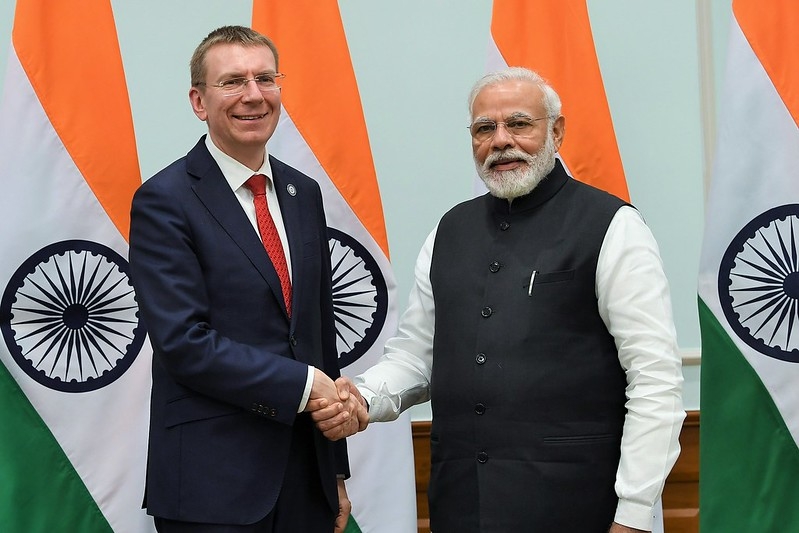On 15 January 2020, the Latvian Minister of Foreign Affairs, Edgars Rinkēvičs, continued his working visit in India and met with the Prime Minister of the Republic of India, Narendra Damodardas Modi, and the Chairman of the Committee on External Affairs of the Parliament of the Republic of India, Prem Prakash Chaudhary. The officials discussed the political dialogue between the two countries and current developments in international relations.
In a discussion with the Chairman of the Parliamentary Committee on External Affairs, the Latvian Foreign Minister expressed hope that a parliamentary group for cooperation with the Baltic States will be established in the Indian Parliament. The Minister also noted that the opening of an Embassy of India in Riga would dynamise the relations between the two countries. In comparison to other Baltic States, Latvia has a number of advantages as a location for opening an embassy.
The officials discussed cooperation in the education sector and international organisations. Edgars Rinkēvičs made note of the dialogue that the Latvian Ministry of Education and Science has begun with the Ministry of Human Resource Development of India, with plans to sign an agreement on the development of joint cooperation programmes that would include specific activities in the field of education. Latvia would like to note, Edgars Rinkēvičs said, that the number of Indian students in Latvia is on the rise, and therefore cooperation based on direct contacts and mutual understanding between authorities in Latvia and India at all working levels in the education and science sector is essential for results-oriented cooperation in the future.
The Latvian Foreign Minister expressed confidence that Latvia is also pursuing its foreign policy priorities through active participation in international organisations: Latvia is a member of the United Nations Economic and Social Council and is running for the elections to the United Nations Security Council in 2025 and the International Law Commission in 2021.
The Minister took part in a panel discussion at the Raisina Dialogue Conference addressing the topic of nationalism in the 21st century, Competing Nationalisms, Universal Norms: Street Power in 21st Century Diplomacy, and the issue of how to reduce the gap between the government-shaped policy and various groups of society and dissatisfaction with that policy observed worldwide. In his remarks to the participants, Edgars Rinkēvičs drew their attention to the increasing global role and responsibility of social media, which influences and causes governments to change their political agenda, including the diplomatic work, in response to the needs or dissatisfaction of society or separate groups of society.
Governments cannot formulate and implement its policy independently and on their own, without partnership with non-governmental organisations and various opinion groups, the Foreign Minister noted. He added that various social media platforms take up a special place in shaping public opinions. This prompts a question on the nature of diplomacy in the 21st century, as communication models keep changing at an unprecedented speed. People are no longer isolated from global politics. Almost any individual can spread news – true or fake – through social media thereby shaping reality and posing new questions. This is a challenge to any society. Regardless of that, diplomacy is not only about the relationship between governments or wide-ranging discussions in meeting rooms behind closed doors. It is about dialogue with each and everyone and about promoting a constructive dialogue between different communities to foster progress and cooperation, Edgars Rinkēvičs said.
Background information
The Raisina Dialogue is a multilateral conference that takes place every year in New Delhi, the capital city of India, bringing together global leaders in policy, business, media and civil society to discuss cooperation on a wide range of pertinent international policy matters. The conference is hosted by the Observer Research Foundation in collaboration with the Government of India and the Ministry of External Affairs.





